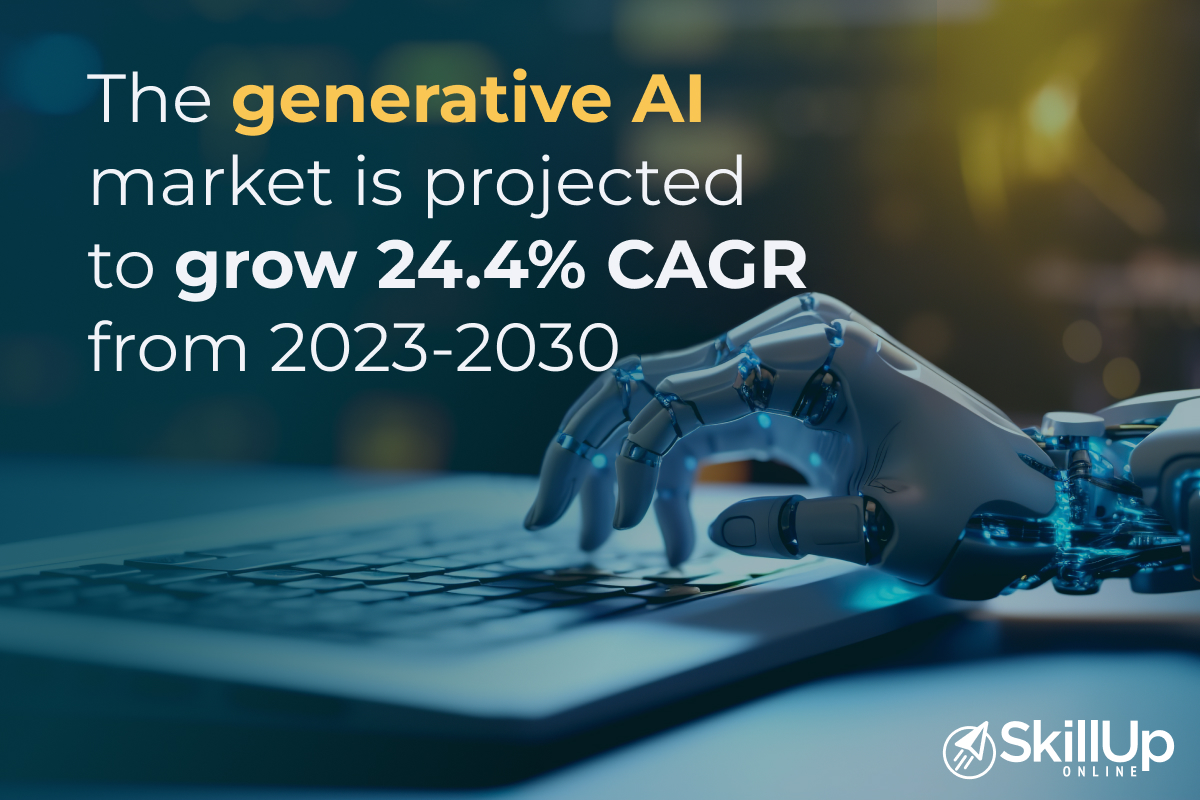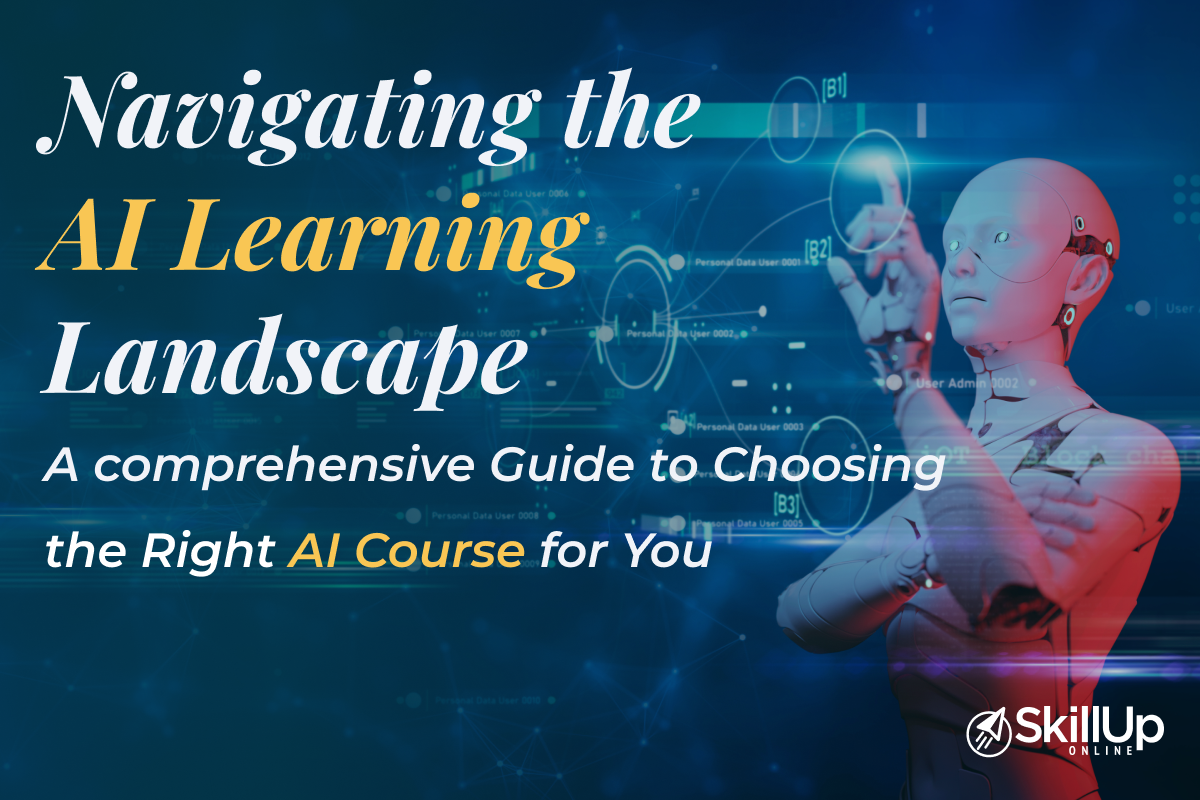As artificial intelligence (AI) continues to revolutionize industries across the board, specialized fields within AI are now emerging as the next frontier.
One such exciting avenue is generative AI, a realm where machines learn to create content that could previously only be crafted through human intelligence. From creating unique artworks to composing music, generative AI is broadening the horizons of what we thought possible.
This means that specializing in a particular aspect of AI, like generative AI, can now offer you a distinct advantage in today’s competitive job market. Specialized knowledge enables you to dive deep into subject matter often untouched in broader AI curricula.
What Is Generative AI?
Definition and Core Concepts
Generative AI is a subset of machine learning algorithms that are designed to create new data that resembles a given dataset but isn’t the same as the original set. Imagine a machine that can “dream up” new ideas or scenarios. It achieves this through algorithms like Generative Adversarial Networks (GANs) and Variational Autoencoders (VAEs), which can analyze complex data patterns and produce new instances that maintain the original data’s characteristics.
Mechanics of Generative AI
The mechanics behind generative AI often involve a two-part system, especially in the case of GANs. One part, the “generator,” aims to produce realistic data. In contrast, the other part, the “discriminator,” tries to distinguish between real and generated data. The system trains itself through this internal tug-of-war, ultimately refining the generator’s ability to create increasingly convincing data.
Real-world Applications of Generative AI
The transformative power of generative AI isn’t just theoretical; it’s already taking shape in our daily lives. In healthcare, it’s being used to simulate molecular structures for new medications, accelerating the drug discovery process. In journalism, AI algorithms are assisting reporters by automatically generating content drafts. Companies even employ generative AI to predict consumer behavior, then enable them to tailor marketing strategies more effectively.
Why Choose a Generative AI Course?
Choosing to specialize in generative AI could be a pivotal point in your career. The demand for experts in specialized AI fields like generative AI is rising across all sectors, including technology, healthcare, and the entertainment industry. According to Statista, the market size of generative AI is expected to reach $ 44.89 Billion in 2023 and is projected to grow at an annual CAGR of 24.4% between 2023 -2030. This makes it attractive from a career perspective.
Niche Skill Development
Diving into generative AI offers an opportunity to hone in on niche skills that are highly sought after. For example, you could specialize in creating realistic video game environments or work on sentiment analysis tools that better understand human emotions. Learning these specialized skills opens doors to specific industries, making you an asset. A great example is SkillUp Online’s Deep Learning with Tensor Flow course, which is tailored to give you the hands-on experience you need for such specialized roles.
Creative Opportunities
Generative AI is at the exciting crossroads where technology meets creativity. For example, AI-powered algorithms have been used to compose film music scores. AI-generated art pieces are making waves in the art world.
This means that taking a course in generative AI can prepare you to be part of these ground-breaking projects. Imagine working on an AI project to co-write screenplays or design fashion collections informed by generative algorithms. The possibilities are both limitless and exhilarating.
Key Components of a Generative AI Course
Algorithmic Foundations: Understanding the foundational algorithms is paramount for anyone looking to dive into generative AI. Here, you’ll engage with the math and logic powering generative models, including but not limited to Generative Adversarial Networks (GANs), autoencoders, and Restricted Boltzmann Machines (RBMs). These algorithms are the architects of the AI’s creative abilities, whether generating music, digital art, or even entire written pieces. They serve as the linchpin for understanding how generative AI can create novel content from scratch.
Practical Implementations: Learning the theory is just one-half of the equation. The other half lies in its practical implementation. A well-rounded generative AI course will provide hands-on experience to cement your theoretical understanding. This could mean projects like developing a chatbot that can carry on a meaningful conversation, creating a piece of digital art, or implementing machine learning algorithms to enhance data analytics tools. Taking a course such as AI Chatbots Without Programming can help you learn real-world applications that are crucial in transforming your theoretical knowledge into actionable skills.
Ethics and Responsible AI: The ethical landscape of AI is evolving rapidly, and understanding it is crucial for anyone venturing into generative AI. A comprehensive course will include modules that focus on the ethical considerations surrounding the use of generative AI. These considerations include the responsible use of data, tackling algorithmic bias, understanding the societal implications, and considering intellectual property when AI creates something new and original. Learners acquire a holistic understanding of generative AI beyond technical skills by delving into these issues.
Selecting the Right Course Level
Beginner Courses: Beginner courses offer an excellent starting point for professionals just dipping their toes into the expansive world of AI. These foundational programs cover the basics of algorithms and machine learning concepts, usually without requiring a deep knowledge of programming or mathematics. Beginner courses aim to provide a general understanding of generative AI’s scope and real-world applications.
Intermediate Courses: Once you have a firm grasp of the basics, intermediate courses such as the platform specific Microsoft AI-50: Develop Generative AI with Azure OpenAI Service take your learning to the next level by deepening your understanding of algorithms and their practical applications. Such platform specific courses enable you to immerse yourself in hands-on projects that mirror real-world challenges on specific platforms. Intermediate courses often introduce more complex algorithms and may delve into specialized areas like natural language processing, image recognition, or data analytics.
Advanced Courses: Advanced courses offer a highly specialized learning experience for professionals with a robust understanding of AI. These courses delve into complex algorithms, involve large-scale projects, and may even cover academic research. You’ll be expected to solve intricate problems and work on projects that have real-world commercial applications. The sky’s the limit here, as you’ll have the chance to push the boundaries of what’s possible with generative AI.
By understanding the offerings and expectations at each level, you can make a more informed decision and select a course that aligns with your learning goals.
Course Features to Consider
When advancing your career in generative AI, your chosen course should offer more than lectures and reading materials. Here are key features to consider for a comprehensive learning experience.
Hands-on Projects: Theoretical knowledge is invaluable, but practice is what hones your skills. Hands-on projects enable you to apply your knowledge in a controlled, real-world setting. Whether it’s generating art using neural networks or crafting AI-driven music, the more you build, the deeper your understanding will be.
Mentorship Support: Navigating the complexities of generative AI can be overwhelming. A course that offers mentorship support provides a safety net as you learn. A mentor can offer targeted advice, review your projects, and give insights that only come from experience.
Community Engagement: Learning thrives in a community. You benefit from multiple perspectives when a course offers forums or Slack channels to engage with peers. This enables you to understand challenges and solutions that you might have yet to consider on your own.
Choosing a course that balances these features will equip you for the theoretical and practical challenges of working in generative AI. Now, you’re not just learning but preparing for success in an ever-evolving field.
Getting the Most Out of Your Course
Pre-course Preparations: Before diving into the complexities of generative AI, set yourself up for success with some foundational knowledge. Brush up on core programming languages like Python and familiarize yourself with basic AI concepts. Consider SkillUp Online’s Python for AI and Development Project course. Doing so enables you to focus on the specialized topics once the course begins.
Active Participation Tips: Active engagement is key to retaining knowledge. Make it a point to participate in discussions, whether it’s in online forums or through direct interactions with your mentors and peers. Ask questions when you’re uncertain and, equally, share your knowledge when others are in doubt.
Showcasing Your Skills
Once you’ve acquired the right skills and mastered the art of generative AI, the next step is to make your expertise visible to the world. By showcasing your skills, you make yourself more marketable and contribute to the growing community of AI enthusiasts and professionals.
Building a Portfolio: Creating a portfolio effectively displays your skills, knowledge, and what you can bring. Include projects you’ve completed, algorithms you’ve developed, or even articles you’ve written on the subject.
SkillUp Online’s courses often come with hands-on projects that you can include in your portfolio. For instance, courses like Deep Learning with TensorFlow and AI Applications with Watson provide practical exercises that make great portfolio pieces.
Industry Certifications: Earning certifications can also make your resume stand out. Consider obtaining certifications like the IBM Applied AI Professional Certificate to give yourself an edge. Certifications not only add value to your portfolio but also verify your skills in a globally recognized way.
Post-course Practices: Your journey doesn’t end with the completion of a course. Continue to practice your skills through personal or freelance projects. Stay updated with the latest in the field by subscribing to journals, participating in webinars, and be active in online communities.
Common Pitfalls and How to Avoid Them
Navigating the intricate landscape of generative AI can be a rewarding but challenging experience. To make your journey smoother, it’s important to be aware of some common pitfalls that learners often fall into and, more importantly, how to avoid them.
Unrealistic Expectations: It’s easy to get carried away with the possibilities of generative AI, imagining a world where AI can produce human-level creative work. While the technology is impressive, it’s essential to have realistic expectations about its current capabilities.
- How to Avoid: Always keep updated with the latest advancements in the field. A good way to do this is via websites dedicated to AI news and updates, such as AI News, AI Trends, and TechCrunch AI.
Lack of Practical Application: Learning generative AI involves many theories, but you will only fully understand its potential and limitations with hands-on experience.
- How to Avoid: Select courses offering practical projects or labs. Places like Kaggle Kernels allow you to share and collaborate on generative AI projects with the community.
Overlooking Ethical Concerns: Generative AI can be used to create deep fakes or manipulate data in unethical ways. While focusing solely on the technology’s capabilities is tempting, ethical considerations should not be ignored.
- How to Avoid: Engage in discussions about the ethical implications of your work and take courses that tackle these issues.
Additional Resources
If you’re looking to dive deeper into generative AI, a wealth of information and tools is available. We’ve compiled a list of resources that can help you further expand your knowledge and skills in this field:
- Academic Papers: Websites like arXiv and Google Scholar are gold mines for peer-reviewed papers on generative AI. You can gain a comprehensive understanding of algorithms, techniques, and best practices from experts in the field.
- Online Courses: SkillUp Online offers many specialized AI courses ranging from beginner to advanced levels, allowing you to find the perfect match for your learning journey.
- Blogs and Articles: For a more informal yet informative take, check out SkillUp Online’s blog posts like How to Start Your AI Career and IT and the AI Revolution: What’s Next for Tech Professionals.
- YouTube Channels: Platforms like YouTube offer tutorial videos that can be incredibly helpful. Many AI field experts have channels where they break down complex topics into easily digestible content.
- Toolkits: Software libraries like TensorFlow and PyTorch are essential for anyone serious about diving into generative AI. These tools offer pre-built functions and models that can significantly speed up your project development.
- Online Forums: Websites like Stack Overflow, Reddit, and specialized AI forums are excellent places to seek advice, share your knowledge, and learn from the community.
- Books: Traditional books on AI and generative AI provide a more structured learning experience. Websites like Amazon offer a wide range of titles that can be delivered to your doorstep.
- Certifications: If you are looking to validate your skills, certifications in AI are highly recommended. SkillUp Online’s TechMaster Certificate Program in Artificial Intelligence with Data Science Program provides an industry-recognized certificate upon completion.
- Webinars and Conferences: Watch for industry webinars and conferences where you can network with experts and like-minded individuals. These events are a great way to stay updated on the latest trends and technologies.
Whether you’re a beginner in AI or looking to specialize in generative AI, these resources offer something to you. Each resource type has unique advantages, from scholarly articles to practical tutorials. So go ahead, explore these avenues, and keep fueling your passion for learning and creating in the field of generative AI.
The field of generative AI is not just another buzzword in the realm of technology; it’s a frontier where science meets imagination. Whether creating artwork, simulating natural language, or composing music, generative AI is truly the playground for creative technologists of tomorrow. As the landscape of artificial intelligence continually evolves, so do the opportunities to specialize and excel in niches like generative AI.
If you would like to know more about how you can build skills and get started, contact our Learner Support Team at [email protected]. They will be more than happy to guide you on your next steps.
FAQs
Q1- What is generative AI, and why is it important?
Ans. Generative AI refers to machine learning models designed to generate new data resembling input data. It has wide-ranging applications, from content creation to data augmentation, making it a significant field in today’s AI ecosystem.
Q2- Who should take a generative AI course
Ans. Anyone interested in AI, data science, or creative technology should consider a generative AI course. It’s particularly useful for professionals in data science, software development, and creative industries like marketing or design.
Q3- What career paths can I pursue after completing a generative AI course?
Ans. You could find opportunities in software development, marketing, healthcare, and entertainment sectors. Roles may include AI engineer, data scientist, content creator, or AI ethics consultant.
Q4- How do I choose the right level of generative AI course?
Ans. Assess your current skill set and goals. Beginners might start with fundamental courses introducing basic concepts, while more advanced learners can dive into specialized algorithms and applications.
Q5- What should I look for in a generative AI course?
Ans. The curriculum’s breadth and depth, hands-on project opportunities, mentorship support, and community engagement are key components to consider. A well-rounded course should offer a blend of theory and practical implementation.
Q6- How do I prepare for a generative AI course?
Ans. Familiarize yourself with basic AI and machine learning concepts and programming languages like Python. Pre-course reading or introductory courses can help you get a solid start.
Q7- What are some common pitfalls to avoid when learning generative AI?
Ans. Avoid setting unrealistic expectations about becoming an expert overnight. Also, don’t neglect the ethical aspects of AI and focus solely on technical skills. Balance is key to a fulfilling and responsible career in generative AI.
SkillUp Online







